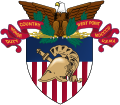
The United States Military Academy (USMA), also referred to metonymically as West Point or simply as Army, is a United States service academy in West Point, New York. It was originally established as a fort during the American Revolutionary War, as it sits on strategic high ground overlooking the Hudson River 50 miles (80 km) north of New York City. It is the oldest of the five American service academies and educates cadets for commissioning into the United States Army.

The United States Naval Academy is a federal service academy in Annapolis, Maryland. It was established on 10 October 1845 during the tenure of George Bancroft as Secretary of the Navy. The Naval Academy is the second oldest of the five U.S. service academies and it educates midshipmen for service in the officer corps of the United States Navy and United States Marine Corps. It is part of the Naval University System. The 338-acre (137 ha) campus is located on the former grounds of Fort Severn at the confluence of the Severn River and Chesapeake Bay in Anne Arundel County, 33 miles (53 km) east of Washington, D.C., and 26 miles (42 km) southeast of Baltimore. The entire campus, known colloquially as the Yard, is a National Historic Landmark and home to many historic sites, buildings, and monuments. It replaced Philadelphia Naval Asylum in Philadelphia that had served as the first United States Naval Academy from 1838 to 1845 when the Naval Academy formed in Annapolis.

The United States Air Force Academy (USAFA) is a United States service academy in El Paso County, Colorado, immediately north of Colorado Springs. It educates cadets for service in the officer corps of the United States Air Force and United States Space Force. It is the youngest of the five service academies, having graduated its first class 65 years ago in 1959, but is the third in seniority. Graduates of the academy's four-year program receive a Bachelor of Science degree and are commissioned as second lieutenants in the U.S. Air Force or U.S. Space Force. The academy is also one of the largest tourist attractions in Colorado, attracting approximately a million visitors each year.
The United States service academies, also known as United States military academies, are federal academies for the undergraduate education and training of commissioned officers for the United States Armed Forces.

The Naval Academy Preparatory School or NAPS is the preparatory school for the United States Naval Academy (USNA). NAPS is located on Naval Station Newport, Rhode Island. The mission of the Naval Academy Preparatory School is "To enhance Midshipman Candidates' moral, mental, and physical foundations to prepare them for success at the United States Naval Academy".
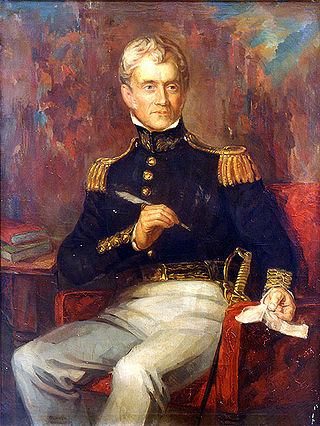
Colonel and Brevet Brigadier General Sylvanus Thayer also known as the "Father of the Military Academy", was an early superintendent of the United States Military Academy at West Point and an early advocate of engineering education in the United States.

The United States Navy Reserve (USNR), known as the United States Naval Reserve from 1915 to 2005, is the Reserve Component (RC) of the United States Navy. Members of the Navy Reserve, called Reservists, are categorized as being in either the Selected Reserve (SELRES), the Training and Administration of the Reserve (TAR), the Individual Ready Reserve (IRR), or the Retired Reserve.

Fort Monmouth is a former installation of the Department of the Army in Monmouth County, New Jersey and the site of a major upcoming Netflix film production campus. The site is surrounded by the communities of Eatontown, Tinton Falls and Oceanport, New Jersey, and is located about five miles (8.0 km) from the Atlantic Ocean. It is approximately an hour and 15 minutes south of Manhattan by vehicle.
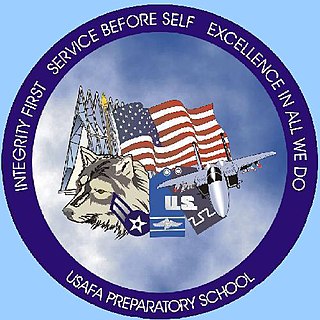
The U.S. Air Force Academy Preparatory School—usually referred to as "the Prep School" or "The P School"—was established in May 1961. The school's founder and first commander was Colonel Lee Charles Black. It is located on the campus of the United States Air Force Academy near the Community Center. The Prep School's mission is to prepare, motivate, and evaluate for admission to and success at the Air Force Academy. Students at the prep school are referred to as "cadet candidates" or more informally as "preppies."
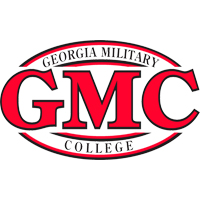
Georgia Military College (GMC) is a public military junior college in Milledgeville, Georgia. It is divided into the junior college, a military junior college program, high school, middle school, and elementary school. It was originally known as Middle Georgia Military and Agricultural College, until 1900. While GMC is a state-chartered and funded institution, its governance is not overseen by either the Board of Regents of the University System of Georgia or the State Board of the Technical College System of Georgia.
Riverside Preparatory Academy is a private, college preparatory, boarding and day school for boys in grades 6 through 12 in Gainesville, Georgia, United States.
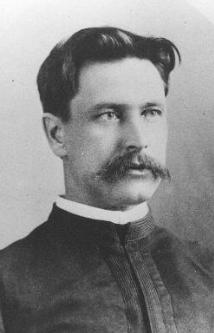
Herman John Koehler was an American football coach, athletics administrator, and United States Army officer. He served as the head football coach at the United States Military Academy from 1897 to 1900, compiling a record of 19–11–3.
The history of the United States Military Academy can be traced to fortifications constructed on the West Point of the Hudson River during the American Revolutionary War in 1778. Following the war, President Thomas Jefferson signed legislation establishing the United States Military Academy (USMA) on the site in 1802. In 1817 the academy was transformed by the appointment of Sylvanus Thayer who drastically reformed the curriculum.
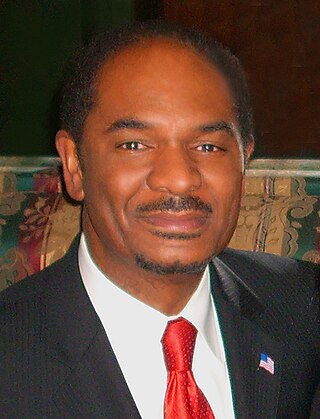
Robert "Rob" L. Gordon III is a cross-sector leader in the government, military, academic, nonprofit and high tech sectors. Gordon was appointed the Deputy Under Secretary of Defense for Military Community and Family Policy on July 19, 2010, serving under U.S. President Barack Obama. In the Defense Department he was responsible for defense-wide policy, program execution and oversight of global community support programs to care for, support, and empower 2 million Service members, 1.2 million military spouses, 2 million children, and over 2 million military families worldwide. He oversaw the Department of Defense school system (DoDEA) that at that time served approximately 90,000 students in 194 schools in 14 districts located in 12 foreign countries, seven states, Guam, and Puerto Rico. He oversaw voluntary education for over half a million active duty military service members; defense resale for over 500 commissaries and exchanges; military spouse education and career advancement for 1.2 million military spouses; child development and youth activities programs; state liaison initiatives; family assistance and non-medical counseling services; and collaborated with Congressional leaders, White House leaders, business and non profit sectors, chambers of commerce, academic communities, and a multitude of federal and state agencies to strengthen the resilience and well-being of the military community.

The Marine Forces Reserve, also known as the United States Marine Corps Reserve (USMCR) and the U.S. Marine Corps Forces Reserve, is the reserve force of the United States Marine Corps. The Marine Corps Reserve is an expeditionary, warfighting organization and primarily designed to augment and reinforce the active duty units of the Marine Corps in their expeditionary role. It is the largest command, by assigned personnel, in the U.S. Marine Corps.
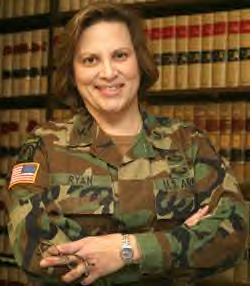
Brigadier general Maritza Sáenz Ryan is a former United States Army officer, and head of the Department of Law at the United States Military Academy. She was the first woman and first Hispanic West Point graduate to serve as an academic department head.

The Junior Reserve Officers' Training Corps is a federal program sponsored by the United States Armed Forces in high schools and also in some middle schools across the United States and at US military bases across the world. The program was originally created as part of the National Defense Act of 1916 and later expanded under the 1964 ROTC Vitalization Act.

Thomas Matthew "Big Tom" Rienzi was a lieutenant general in the U.S. Army Signal Corps who served during World War II, the Korean War and Vietnam War. He implemented the modernization of signal units from the usage of just wire and radio, through the growth of strategic satellite communications, to the integration of computer systems at even the tactical level.
Augustus Milton Gurney was an officer in the United States Army with the rank of brigadier general during World War II. A graduate of the United States Military Academy, he served mostly in the staff positions and completed his career as Assistant Chief of Staff for Operations (G-3), First United States Army.
Braulio Marcelo Castillo is the former CEO of Strong Castle, a defunct information technology company based in Virginia.
















